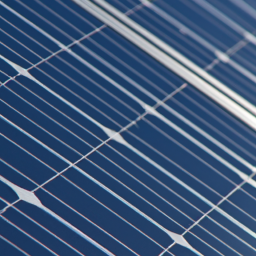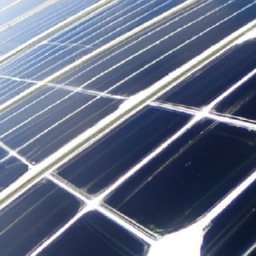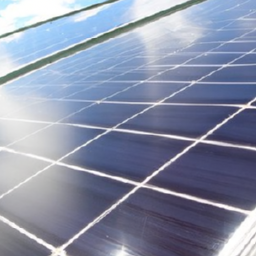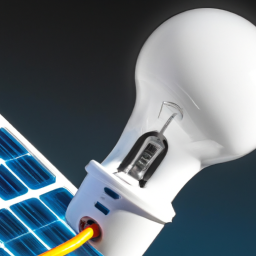Are solar generators quiet? Absolutely! In fact, one of the remarkable benefits of solar generators is their silent operation. Unlike traditional generators that can be noisy and disruptive, solar generators rely on the power of the sun to generate electricity without creating any noise pollution. So, whether you’re using a solar generator to power your outdoor adventures, emergency backup, or everyday needs, you can enjoy a peaceful and tranquil environment without any buzzing or humming in the background.
Not only do solar generators offer a sustainable and eco-friendly alternative to traditional power sources, but their whisper-quiet operation ensures a pleasant and serene experience. Whether you’re camping in the wilderness, hosting an event outdoors, or simply want to have a reliable backup power option at home, you can count on solar generators to provide the electricity you need without any unwanted noise. So go ahead and embrace clean, silent energy with solar generators, and say goodbye to the noisy disruptions of conventional generators.
Understanding Solar Generators
What are Solar Generators?
Solar generators are portable devices that convert sunlight into electricity using photovoltaic (PV) panels. Unlike traditional generators that rely on fuel combustion, solar generators harness clean and renewable energy from the sun. These generators are becoming increasingly popular due to their eco-friendly and sustainable nature.
How Do Solar Generators Work?
Solar generators consist of three main components: solar panels, a charge controller, and a battery. The solar panels capture sunlight and convert it into direct current (DC) electricity. The charge controller regulates the flow of electricity and prevents overcharging of the battery. The battery stores the electricity generated by the solar panels and converts it into alternating current (AC) electricity when needed. This AC electricity is then available for powering various devices and appliances.
Various Components of a Solar Generator
Solar generators come in different sizes and configurations, but they typically include additional components such as inverters, USB ports, AC outlets, and LED indicators. Inverters convert DC electricity from the battery into AC electricity, allowing for compatibility with a wider range of devices. USB ports enable charging of personal electronics such as smartphones and tablets. AC outlets provide a power source for larger devices, while LED indicators display the battery status and solar input.
Comparing Solar Generators with Traditional Generators
Key Similarities
Both solar generators and traditional generators provide a source of electricity. They can power appliances, tools, and electronic devices, making them useful in various situations. Additionally, both types of generators can be used for emergency backup power during power outages or in remote locations where grid power is unavailable.
Key Differences
One of the main differences between solar generators and traditional generators lies in their source of energy. While solar generators rely on sunlight, traditional generators run on fuel such as gasoline, diesel, or propane. This distinction makes solar generators more environmentally friendly, as they produce zero emissions and depend solely on renewable energy.
Another significant difference is the noise level produced by the generators. Solar generators are known for their quiet operation, while traditional generators tend to be much louder due to the mechanical components and combustion process involved.
Effective Use Cases for Each
Solar generators are ideal for situations where noise level, portability, and eco-friendliness are paramount. They are great for outdoor activities such as camping, RV trips, and tailgating, as they provide silent and clean energy without the need for refueling. Solar generators are also suitable for residential use, particularly in areas with noise restrictions or where peace and quiet are essential.
On the other hand, traditional generators are more suitable for heavy-duty applications or situations where a significant amount of power is required. They are commonly used in construction sites, as backup power for homes, or during natural disasters when access to electricity is disrupted.
Understanding the Sound Levels of Generators
What Causes Noise in Generators?
Noise in generators is mainly caused by the mechanical components and the combustion process involved in converting fuel into electricity. Internal combustion engines produce significant noise due to the rapid movement of pistons, the rotation of the crankshaft, and the exhaust gases released during operation.
How is Sound Measured?
Sound is measured in decibels (dB) using a logarithmic scale. The higher the decibel reading, the louder the noise. Sound levels are typically measured at a distance of 7 meters (about 23 feet) from the source, which is the industry standard for comparing generator noise levels.
Average Sound Levels of Traditional Generators
Traditional generators can produce varying levels of noise, depending on their size, power output, and design. Smaller portable generators typically produce around 70-80 dB, which is comparable to the noise level of a vacuum cleaner. Larger standby generators can generate noise levels of 80-100 dB, which is similar to the noise of a chainsaw or a motorcycle.
Sound Level of Solar Generators
Explaining the Quiet Nature of Solar Generators
Solar generators are known for their whisper-quiet operation. This is primarily due to the absence of mechanical components and the combustion process found in traditional generators. Since solar generators rely on the conversion of sunlight into electricity via photovoltaic panels, there are no moving parts that produce significant noise.
Factors Affecting the Sound Level of Solar Generators
The sound level of a solar generator can be influenced by several factors, including the design of the enclosure, the type and quality of the components used, and the efficiency of the cooling system. Manufacturers of solar generators strive to minimize noise levels by implementing soundproofing materials and advanced engineering techniques.
Typical Noise Levels Experienced with Solar Generators
The noise level of solar generators can vary depending on the specific model and its design. On average, solar generators produce less than 60 dB of noise during operation, which is comparable to a normal conversation or a gentle hum. This makes them virtually silent in comparison to traditional generators, providing a peaceful and undisturbed power source.
Impact of Noise from Generators
Effects on Human Health
Excessive noise from generators can have detrimental effects on human health. Prolonged exposure to high noise levels can lead to stress, fatigue, sleep disturbances, and even permanent hearing damage. The constant presence of loud generator noise in residential areas can adversely affect the overall well-being and quality of life for individuals living nearby.
Impact on Environment
Noise pollution from generators can also have an impact on the environment. Excessive noise disrupts wildlife habitats, making it difficult for animals to communicate, hunt, or reproduce. Additionally, noise pollution can potentially interfere with the natural balance of ecosystems and contribute to the decline of certain species.
Legal Restrictions on Generator Noise
Many regions have implemented legal restrictions on generator noise to protect public health and maintain a peaceful environment. These restrictions typically specify maximum allowable noise levels during certain hours and in specific zones. By choosing a quieter power source such as a solar generator, individuals can comply with noise regulations and minimize the negative impact on their surroundings.
Advantages of Quiet Solar Generators
Comfort in Residential Areas
The quiet operation of solar generators makes them an excellent choice for residential areas. Their low noise levels ensure minimal disturbance to occupants, allowing for peaceful enjoyment of homes, gardens, and outdoor spaces. Solar generators are also an ideal solution for neighborhoods or communities that have noise restrictions, ensuring a harmonious living environment for all.
Reduced Noise Pollution
By opting for quiet solar generators, individuals can actively contribute to reducing noise pollution in their surroundings. Whether used in outdoor recreational activities, construction sites, or during emergency situations, solar generators provide a silent alternative to traditional generators, creating a more peaceful atmosphere for everyone involved.
Improved Efficiency
Solar generators not only offer a quieter operation but also boast improved efficiency compared to traditional generators. They eliminate the need for constant refueling, as they rely on sunlight for power generation. Solar generators require minimal maintenance, making them hassle-free and cost-effective in the long run.
How to Make Solar Generators Quieter
Effective Soundproofing Methods for Solar Generators
While solar generators already operate quietly, there are additional soundproofing methods that can further reduce noise levels. Enclosing the generator in a portable soundproof box or using sound-absorbing materials can significantly dampen any residual noise. Proper ventilation and cooling system design can also help in maintaining optimal temperature without compromising the generator’s quiet operation.
Maintaining Your Solar Generator for Optimal Quiet Operation
Regular maintenance is essential to ensure the optimal performance and quiet operation of your solar generator. Cleaning the solar panels, checking and tightening connections, and monitoring the battery health are crucial steps in maintaining efficiency. Following the manufacturer’s guidelines for maintenance and scheduling professional inspections can help identify and address any potential issues before they impact the generator’s quiet operation.
Types of Quiet Solar Generators
Portable Solar Generators
Portable solar generators are compact and lightweight, making them highly convenient for outdoor activities such as camping, hiking, and boating. They are designed to be easily transportable and provide a reliable power source without disturbing the peaceful ambiance of nature.
Standby Solar Generators
Standby solar generators are larger and more powerful than portable models. They are typically installed as permanent fixtures in homes or businesses, serving as backup power systems during utility outages. Standby solar generators ensure uninterrupted power supply without the noise and pollution associated with traditional backup generators.
On-grid vs off-grid Solar Generators
On-grid solar generators are connected to the main power grid. They generate electricity when the sun is shining and feed any excess power back into the grid, earning credits or reducing utility bills. Off-grid solar generators, on the other hand, are independent systems that store electricity in batteries for use when the sun is not available or during power outages. These off-grid systems are perfect for remote locations or areas with unreliable grid access.
Top Quiet Solar Generator Models
Features to Look for in Quiet Solar Generators
When choosing a quiet solar generator, several features should be considered. Look for generators with efficient solar panels that can capture maximum sunlight, ensuring faster charging and prolonged operation. Battery capacity and output power are also important factors, as they dictate the energy storage and device compatibility. Other features to consider are noise ratings, portability, durability, and additional outlets or ports for versatile use.
Brief Review of the Quietest Solar Generator Models
-
Goal Zero Yeti 400 Solar Generator: This portable solar generator combines reliability and silence, making it suitable for outdoor activities and small power needs. With a noise level of less than 45 dB, it provides a whisper-quiet power source.
-
Jackery Explorer 1000 Solar Generator: The Jackery Explorer 1000 offers a higher power capacity, making it suitable for charging multiple devices or running small appliances. Despite its power output, it remains remarkably quiet, ensuring a peaceful energy source.
-
EcoFlow Delta 1300 Solar Generator: Known for its high power output and versatility, the EcoFlow Delta 1300 delivers a silent performance. Its noise level of less than 60 dB and durable construction make it an excellent choice for a wide range of applications.
Practical Applications of Quiet Solar Generators
Use in Residential Areas
Quiet solar generators provide a reliable power source for residential areas, especially during power outages. They ensure uninterrupted operation of essential appliances such as refrigerators, medical devices, and lighting systems without disturbing the peace and comfort of homes.
Application in Outdoor Recreational Activities
Quiet solar generators have become a popular choice for outdoor enthusiasts involved in activities such as camping, boating, and RV trips. They allow for a peaceful and eco-friendly power source, enabling individuals to enjoy nature without the disruptive noise and emissions associated with traditional generators.
Usage in Emergency and Disaster Situations
During emergencies and natural disasters, access to electricity becomes vital. Quiet solar generators can play a crucial role in providing immediate power for charging communication devices, running medical equipment, and powering essential appliances. Their silent operation ensures minimal disturbance and a sense of calm in times of crisis.
In conclusion, solar generators offer a quiet and efficient alternative to traditional generators. Their environmentally friendly nature, low noise levels, and versatility make them an increasingly popular choice for various applications. Whether used in residential areas, outdoor recreational activities, or emergency situations, quiet solar generators provide a reliable and silent power source, ensuring comfort, sustainability, and peace of mind.




